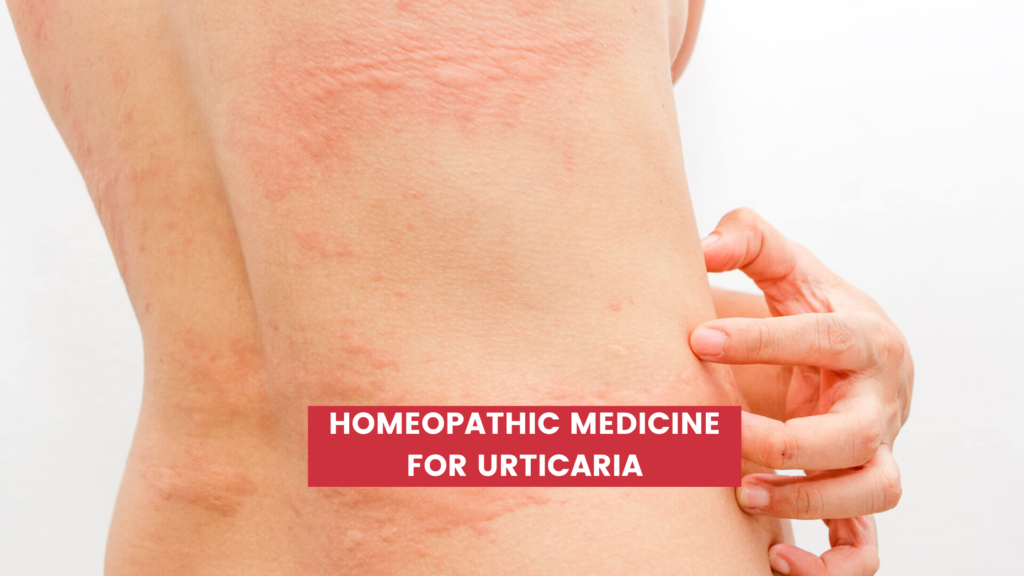Urticaria, commonly known as hives, is a skin condition characterized by red, itchy welts that can appear anywhere on the body. These welts may vary in size and can be triggered by a variety of factors, including allergies, stress, or environmental factors. While conventional treatments often focus on managing the symptoms with antihistamines, homeopathy offers a holistic approach by addressing the underlying causes of urticaria and promoting long-term healing. In this blog, we will explore the causes, symptoms, and the 10 most effective homeopathic remedies for urticaria.
Causes of Urticaria
Urticaria occurs when the body releases histamines in response to a trigger, leading to inflammation and the formation of red, itchy welts. There are several common causes of urticaria, including:
- Allergic Reactions: Urticaria is often triggered by allergic reactions to food (such as shellfish, nuts, or eggs), medications, or insect stings.
- Environmental Factors: Exposure to extreme temperatures, sunlight, or water can trigger hives in sensitive individuals.
- Infections: Viral infections, bacterial infections, and parasitic infections can sometimes lead to the development of hives.
- Stress: Emotional stress or anxiety can lead to a release of histamines, causing urticaria in some individuals.
- Physical Triggers: Pressure on the skin from tight clothing, scratching, or friction can cause localized hives.
- Autoimmune Disorders: In some cases, the immune system mistakenly attacks the body’s own tissues, leading to chronic urticaria.
- Unknown Causes: Idiopathic urticaria is diagnosed when the cause of the condition remains unknown.
Symptoms of Urticaria
The symptoms of urticaria can range from mild to severe, depending on the individual and the trigger. The most common symptoms of urticaria include:
- Red or Skin-Colored Welts: These raised, itchy welts can vary in size and may appear anywhere on the body.
- Itching: The affected area may feel intensely itchy, leading to discomfort and scratching.
- Swelling: In some cases, hives may cause swelling in the deeper layers of the skin, known as angioedema, which can affect the lips, eyes, and throat.
- Burning or Stinging Sensation: Some individuals may experience a burning or stinging feeling in the areas affected by hives.
- Welts that Change Shape or Move: The welts may shift in location, change shape, or merge to form larger patches.
Homeopathic Medicine for Urticaria
Homeopathy provides a natural and individualized approach to treating urticaria by addressing the underlying causes and reducing the body’s sensitivity to triggers. Here are 10 of the most effective homeopathic remedies for urticaria:
1. Apis Mellifica
Apis Mellifica is one of the most effective remedies for treating urticaria with swelling, burning, and stinging sensations. It is particularly useful for hives that appear suddenly and are accompanied by red, swollen skin. The individual often feels better with cold applications.
When to use:
- Sudden onset of red, swollen hives
- Intense burning and stinging sensation
- Symptoms relieved by cold applications
2. Urtica Urens
Urtica Urens is highly effective for urticaria that causes intense itching and burning. This remedy is particularly useful when hives develop after exposure to heat or sun, or as a result of allergic reactions to shellfish.
When to use:
- Intense itching and burning from hives
- Urticaria triggered by heat or sun exposure
- Allergic reactions to shellfish
3. Rhus Toxicodendron
Rhus Toxicodendron is ideal for individuals who develop hives after exposure to cold or wet weather. It is also useful for hives that worsen at night or with movement. The itching is often accompanied by restlessness.
When to use:
- Hives triggered by cold or wet weather
- Itching worsened by movement or at night
- Accompanied by restlessness and discomfort
4. Sulphur
Sulphur is highly effective for chronic urticaria, especially when there is intense itching and burning of the skin. The itching tends to worsen at night and from warmth. This remedy is useful for individuals with recurring hives.
When to use:
- Chronic urticaria with intense itching
- Itching worse at night and from warmth
- Recurring hives that flare up frequently
5. Natrum Muriaticum
Natrum Muriaticum is useful for individuals who develop hives after emotional stress, particularly grief or suppressed emotions. The hives are typically associated with intense itching, and the individual may experience cold sores alongside the hives.
When to use:
- Urticaria triggered by emotional stress or grief
- Intense itching with hives
- Accompanied by cold sores
6. Arsenicum Album
Arsenicum Album is a great remedy for urticaria with dry, itchy skin that worsens at night or in cold air. It is particularly effective for individuals who feel restless and anxious, especially when the itching leads to burning sensations.
When to use:
- Urticaria with dry, itchy skin
- Itching worse at night or in cold air
- Accompanied by restlessness and anxiety
7. Pulsatilla
Pulsatilla is recommended for urticaria triggered by exposure to warm weather or after eating rich, fatty foods. The individual often feels better in fresh, cool air. This remedy is particularly useful for hives that are accompanied by digestive disturbances.
When to use:
- Hives triggered by warm weather or fatty foods
- Symptoms relieved by fresh, cool air
- Accompanied by digestive issues
8. Ledum Palustre
Ledum Palustre is effective for urticaria caused by insect bites or stings. The affected area may feel cold to the touch, and the individual may feel relief from applying cold compresses to the skin.
When to use:
- Hives triggered by insect bites or stings
- Skin feels cold to the touch
- Relieved by cold applications
9. Lachesis
Lachesis is useful for individuals with chronic or recurrent urticaria that worsens in hot weather or at night. The hives are often accompanied by a bluish or purplish discoloration of the skin, and the individual may feel better after discharging the fluid from the hives.
When to use:
- Chronic or recurrent hives
- Worsened by heat and at night
- Accompanied by bluish discoloration of the skin
10. Bovista
Bovista is helpful for hives triggered by cosmetics or exposure to chemicals. The hives are typically associated with itching and swelling, and the individual may experience worsening symptoms after eating or drinking.
When to use:
- Hives caused by cosmetics or chemicals
- Swelling and itching after exposure to triggers
- Worsened after eating or drinking
Conclusion
Urticaria can cause significant discomfort, but homeopathy provides a natural and effective solution by addressing the underlying causes of the condition and promoting the body’s natural healing process. Remedies like Apis Mellifica, Urtica Urens, and Rhus Toxicodendron are particularly effective in managing hives and reducing itching, swelling, and burning sensations. As always, it is important to consult a qualified homeopathic practitioner to find the most appropriate remedy for your individual symptoms. With the right treatment, homeopathy can provide lasting relief from urticaria and improve overall skin health.


